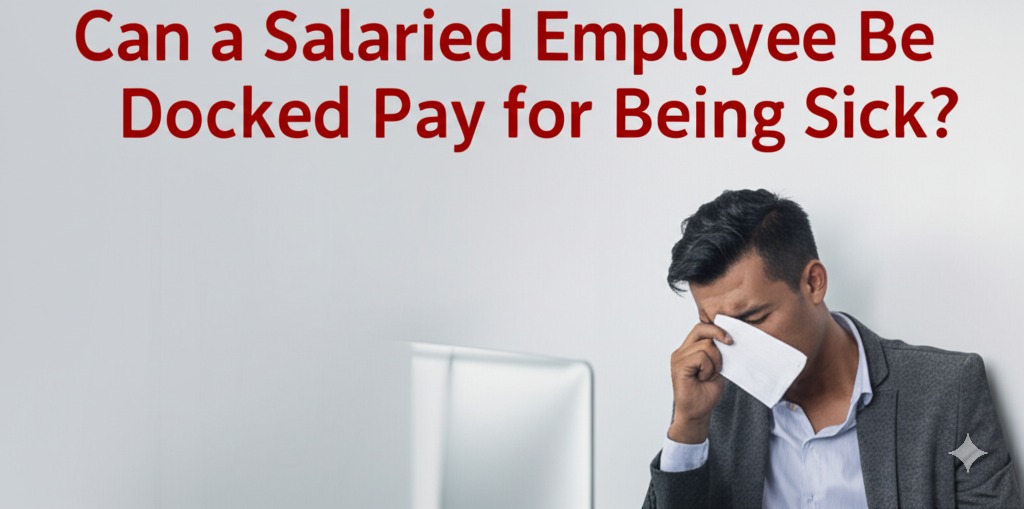
When you’re on a salary, it’s natural to expect financial stability—even during sick days. But what happens when illness strikes and you miss work? Can a salaried employee be docked pay for being sick? The answer depends on several factors, including employment classification, company policies, and federal labor laws. Let’s break it all down so you know your rights and what to expect when health issues affect your work attendance.
Understanding Salaried Employment
What Does It Mean to Be a Salaried Employee?
A salaried employee is typically paid a fixed amount each pay period, regardless of the number of hours worked. This is different from hourly employees, who are compensated based on the hours they clock in.
- Salaried positions often come with benefits such as paid time off (PTO) and health insurance.
- Salaried roles can be classified as exempt or non-exempt under the Fair Labor Standards Act (FLSA).
This classification plays a crucial role in determining whether your pay can be docked if you take a sick day.
Exempt vs. Non-Exempt: What’s the Difference?
The FLSA categorizes employees as:
- Exempt: Not entitled to overtime pay; generally salaried and working in executive, administrative, or professional roles.
- Non-Exempt: Entitled to overtime; can be salaried or hourly.
Exempt employees are more protected from pay deductions than non-exempt ones—but there are exceptions.
When Can a Salaried Employee’s Pay Be Docked?
Situations Where Pay Deductions Are Allowed
According to the U.S. Department of Labor, employers can dock pay from an exempt salaried employee only under specific circumstances, such as:
- Full-day absences for personal reasons (not related to illness or disability)
- Full-day absences due to illness or injury if the employer has a bona fide sick leave plan and the employee has exhausted their available leave
- Penalties for violations of safety rules
- Unpaid disciplinary suspensions for workplace misconduct
What If You’re Sick for Just Part of the Day?
Here’s where things get nuanced. If you’re exempt and only miss a few hours due to illness, your employer cannot deduct partial-day absences from your salary. However, they can deduct from your accrued PTO or sick leave bank.
If you’re non-exempt, your employer has more flexibility in adjusting your pay based on hours worked—even if you’re salaried.
What Happens When PTO Runs Out?
If you’ve used up all your paid sick leave or PTO:
- Your employer can dock your pay for full days missed due to illness, even if you’re salaried and exempt.
- However, they cannot deduct for partial-day absences.
It’s also worth checking your state’s sick leave laws, which may provide additional protections.
Employer Sick Leave Policies Matter
The Role of Company Policies
Employers often outline sick leave policies in:
- Employee handbooks
- Employment contracts
- HR guidelines
These documents usually detail:
- How much sick time you’re entitled to
- Whether unused sick leave rolls over
- How pay deductions are handled when sick time is exhausted
Knowing your company’s policy is key to understanding what you’re entitled to.
Legal Requirements for Sick Leave
Some states and cities have enacted mandatory paid sick leave laws. For example:
- California, New York, and Washington require paid sick leave.
- These laws often apply regardless of exempt status.
Check your state’s labor department website to learn your rights in your area.
What to Do If Your Pay Was Docked Improperly
Steps to Take
If you believe your employer wrongly deducted pay:
- Review your pay stub and sick leave records
- Consult your employee handbook or contract
- Speak with HR or your manager to clarify the issue
- If unresolved, file a complaint with the Wage and Hour Division of the Department of Labor
You can also consider seeking legal advice from an employment lawyer.
Summary: Know Your Rights as a Salaried Employee
So, can a salaried employee be docked pay for being sick? Yes—but only under specific circumstances.
✅ Exempt employees are generally protected from pay deductions for partial-day absences.
✅ Full-day absences due to illness may be unpaid if sick leave is used up.
✅ Non-exempt employees, even if salaried, can have pay adjusted based on actual hours worked.
✅ Company policy and state law play a big role in what’s allowed.
Final Thoughts
Your salary is meant to provide predictability, but that doesn’t always mean you’re immune to deductions. Understanding how federal laws, state regulations, and employer policies interact is essential. If you’re unsure about your rights, don’t hesitate to ask HR or consult a legal professional.
Stay informed, protect your paycheck, and take the time you need to recover when you’re sick—without fear or confusion.

Andre Cuevas provides career insights, job search strategies, and professional advice to help individuals navigate the job market and achieve their career goals.





